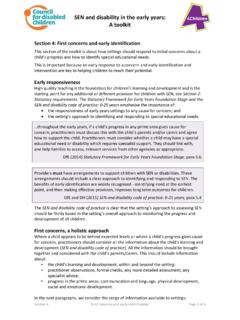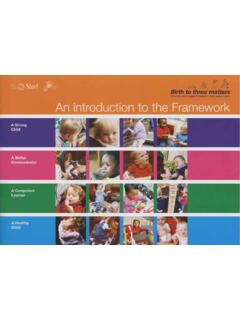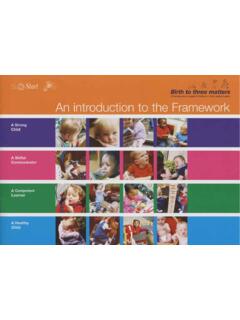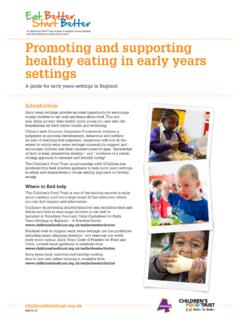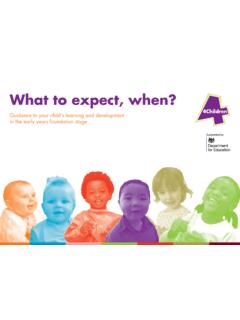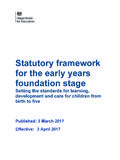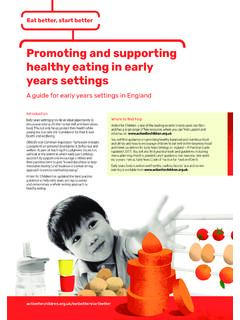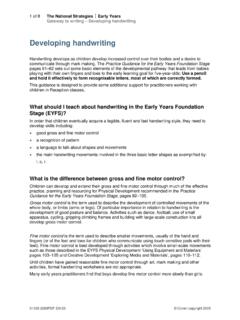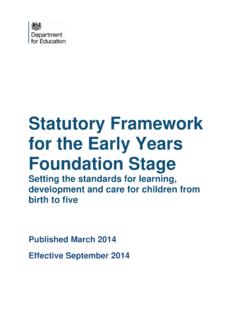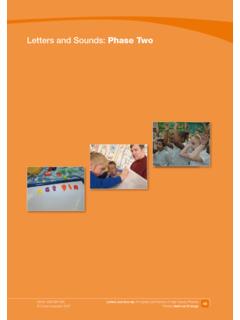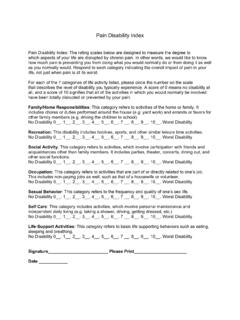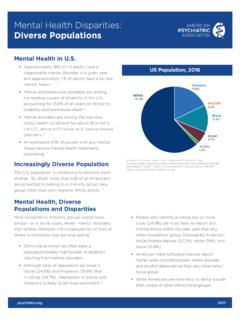Transcription of SEN and disability in the early years: A toolkit
1 SEN and disability in the early years: A toolkit Section 8 Working with other professionals Page 1 of 7 Section 8: Working with other professionals and other sources of support and information This section of the toolkit is about working with professionals beyond the setting and making use of sources of information and support available locally. It is important because there may be a range of professionals whom early years settings might come into contact with in their day to day work with children with SEND.
2 The collaboration between these professionals and parents is essential to improving outcomes for individual children. Practitioners must consider whether a child may have a special educational need or disability , which requires specialist support . They should link with, and help families to access, relevant services from other agencies as appropriate. DfE (2014) Statutory Framework for early Years Foundation Stage, para Involving specialists Where a child continues to make less than expected progress, despite evidence-based support and interventions that are matched to the child s area of need, practitioners should consider involving appropriate who may be able to identify effective strategies, equipment, programmes or other interventions to enable the child to make progress towards the desired learning and development outcomes.
3 The decision to involve specialists should be taken with the child s parents. DfE and DH (2015) SEN and disability code of practice; 0-25 years, para The Code of Practice makes it clear that whilst all practitioners are responsible for working with children with SEN, it is the role of the SENCO to co-ordinate the support across the setting and specifically to liaise with professionals or agencies beyond the setting (Code of Practice, para ). For children identified as having SEN, the cycle of assess, plan, do, review may indicate the need for additional input from those with more specialist expertise.
4 This may include more specialist assessment of the child s needs to make sure that provision is matched to the child s needs as well as advice on effective strategies, equipment, programmes or other interventions to enable the child to make progress towards the desired ..outcomes. In identifying a child as needing SEN support , the early years practitioner, working with the setting SENCO and the child s parents, will have carried out an analysis of the child s needs. This initial assessment should be reviewed regularly to ensure that support is matched to need.
5 Where there is little or no improvement in the child s progress, more specialist assessment may be called for from specialist teachers or from health, social services or other agencies beyond the setting. Where professionals are not already working with the setting, the SENCO should contact them, with the parents agreement. DfE and DH (2015) SEN and disability code of practice; 0-25 years, para Section 8 Working with other professionals Page 2 of 7 The early years SENCO would normally contact the external specialist, with the parents agreement.
6 Different professionals provide support in different ways: some professionals will work with staff, some with children directly; many will observe children in the setting and talk to staff as part of their assessments; some may be able to provide training for staff; some will model strategies or demonstrate how to best use resources to support individual children. The local authority should ensure there is sufficient expertise amongst local providers to support children with SEN. To fulfil their role in identifying and planning for the needs of children with SEN, local authorities should ensure that there is sufficient expertise and experience amongst local early years providers to support children with SEN.
7 DfE and DH (2015) SEN and disability code of practice; 0-25 years, para The Local Offer Local Authorities must publish a local offer of information about the provision available for children in their area who have SEN or disabilities. This information is across education, health and social care. Key elements, relevant to the early years are summarised below (drawn from chapter 4 of the Code of Practice). The local offer must include a description of the provision that the LA expects to be available from providers of all relevant early years education.
8 It must also include information about the support available across education, health and social care services for disabled children and children with SEN, including information about: services assisting providers to support young children with medical conditions; childcare for disabled children and children with SEN; Information, Advice and support Services: services providing parents and children with information, advice and support on SEN and disability ; support groups who can support parent carers of disabled children.
9 The local offer should also include information about: provision such as Area SENCOs, SEN support or learning support services, sensory support services or specialist teachers, therapies such as speech and language therapy; support available to parents to aid their child s development at home, including such services as Portage; arrangements for identifying and assessing children s needs in the early years; arrangements for reviewing children s progress including health and development reviews between the ages of 2 and 3; the LA s arrangements for providing top-up funding for children with high needs; the arrangements for EHC needs assessments and plans.
10 The local offer is a valuable resource for practitioners and a way of signposting parents to available support . It will be important for the setting SENCO to become familiar with the local offer for their area. Section 8 Working with other professionals Page 3 of 7 Professionals who may be in your support and advice network Area SENCO Local authorities often make use of Area SENCOs to provide advice and guidance to early years providers on the development of inclusive early years environments. Other titles may be used for those fulfilling this role, for example, Inclusion adviser.
